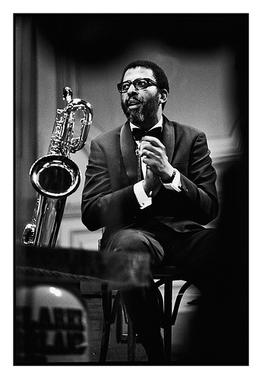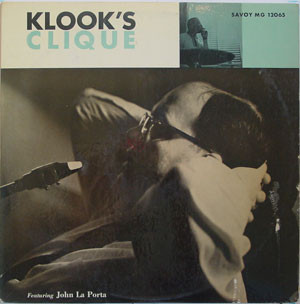Related Research Articles

Bebop or bop is a style of jazz developed in the early-to-mid-1940s in the United States. The style features compositions characterized by a fast tempo, complex chord progressions with rapid chord changes and numerous changes of key, instrumental virtuosity, and improvisation based on a combination of harmonic structure, the use of scales and occasional references to the melody.

John Birks "Dizzy" Gillespie was an American jazz trumpeter, bandleader, composer, educator and singer. He was a trumpet virtuoso and improviser, building on the virtuosic style of Roy Eldridge but adding layers of harmonic and rhythmic complexity previously unheard in jazz. His combination of musicianship, showmanship, and wit made him a leading popularizer of the new music called bebop. His beret and horn-rimmed spectacles, scat singing, bent horn, pouched cheeks, and light-hearted personality provided one of bebop's most prominent symbols.

Tadley Ewing Peake Dameron was an American jazz composer, arranger, and pianist.

Oscar Pettiford was an American jazz double bassist, cellist and composer. He was one of the earliest musicians to work in the bebop idiom.

Theodore "Fats" Navarro was an American jazz trumpet player. He was a pioneer of the bebop style of jazz improvisation in the 1940s. He had a strong stylistic influence on many other players, including Clifford Brown.

Kenneth Clarke Spearman, nicknamed Klook, was an American jazz drummer and bandleader. A major innovator of the bebop style of drumming, he pioneered the use of the ride cymbal to keep time rather than the hi-hat, along with the use of the bass drum for irregular accents.
John Daniel LaPorta was a jazz clarinetist and composer.

Minton's Playhouse is a jazz club and bar located on the first floor of the Cecil Hotel at 210 West 118th Street in Harlem, Manhattan, New York City. It is a registered trademark of Housing and Services, Inc. a New York City nonprofit provider of supportive housing. The door to the actual club itself is at 206 West 118th Street where there is a small plaque. Minton's was founded by tenor saxophonist Henry Minton in 1938. Minton's is known for its role in the development of modern jazz, also known as bebop, where in its jam sessions in the early 1940s, Thelonious Monk, Bud Powell, Kenny Clarke, Charlie Christian, Charlie Parker and Dizzy Gillespie pioneered the new music. Minton's thrived for three decades until its decline near the end of the 1960s, and its eventual closure in 1974. After being closed for more than 30 years, the newly remodeled club reopened on May 19, 2006, under the name Uptown Lounge at Minton's Playhouse. However, the reopened club was closed again in 2010. Remodeling began again in 2012.

Sahib Shihab was an American jazz and hard bop saxophonist and flautist. He variously worked with Luther Henderson, Thelonious Monk, Fletcher Henderson, Tadd Dameron, Dizzy Gillespie, Kenny Clarke, John Coltrane and Quincy Jones among others.
"Salt Peanuts" is a bebop tune reportedly composed by Dizzy Gillespie in 1942, credited "with the collaboration of" drummer Kenny Clarke. It is also cited as Charlie Parker's. The original lyrics have no exophoric meaning. Instead, they are a skat/bebop vocal which matches the octave note interval played predominantly throughout the song. The Pointer Sisters subsequently included vocalese lyrics for their rendition of Salt Peanuts as recorded on their That's a Plenty album.
Frederic Homer Johnson, known professionally as Keg Johnson, was an American jazz trombonist.
Ronald Ball was a jazz pianist, composer and arranger, born in Birmingham, England.

Groovin' High is a 1955 compilation album of studio sessions by jazz composer and trumpeter Dizzy Gillespie. The Rough Guide to Jazz describes the album as "some of the key bebop small-group and big band recordings."

Jivin' in Be-Bop is a 1947 musical film produced by William D. Alexander and starring Dizzy Gillespie and His Orchestra, which included notable musicians such as bassist Ray Brown, vibraphonist Milt Jackson, and pianist John Lewis. It also features singers Helen Humes and Kenny "Pancho" Hagood, Master of Ceremonies Freddie Carter, and a group of dancers.
Kermit "Scotty" Scott was a jazz tenor saxophonist. Dizzy Gillespie considered Scott “one of the founders of our music” [bop].
Dee Gee Records was a jazz record company and independent record label founded in Detroit, Michigan in 1951 by Dizzy Gillespie and Dave Usher.

Bop City was a jazz club operated by John "Jimbo" Edwards in San Francisco from 1949 to 1965. It was situated in the back room of a Victorian house at 1690 Post Street, in the Western Addition district. During its heyday, the venue was known for late-night live performances of many popular jazz artists, including Billie Holiday, Louis Armstrong, Chet Baker, and Charlie Parker, and was one of the most famous jazz clubs of its time, being instrumental in popularizing the modern jazz style in San Francisco.

Klook's Clique is an album led by drummer Kenny Clarke recorded in 1956 and first released on the Savoy label.
Frank Paparelli was an American Jazz pianist, Composer and Author. He was a pianist in Dizzy Gillespie's band during the mid-1940s, and is notable as the co-writer of the bebop standard "A Night in Tunisia" and "Blue 'n' Boogie".
References
- ↑ Cole, Bill (2001). John Coltrane. Da Capo Press. p. 44. ISBN 0-306-81062-X.
- ↑ Communications, Emmis (May 1976). "Texas Monthly". Domain: The Lifestyle Magazine of Texas Monthly. Emmis Communications: 42. ISSN 0148-7736.
- ↑ Harris, Hyland. "Clarke, Kenny "Klook" (Kenneth Spearman)". Encyclopedia of Jazz Musicians. Archived from the original on September 22, 2013. Retrieved March 16, 2016.
- ↑ Kernfeld, Barry (1999). "Clarke, Kenny". American National Biography . Oxford University Press. doi:10.1093/anb/9780198606697.article.1802594.